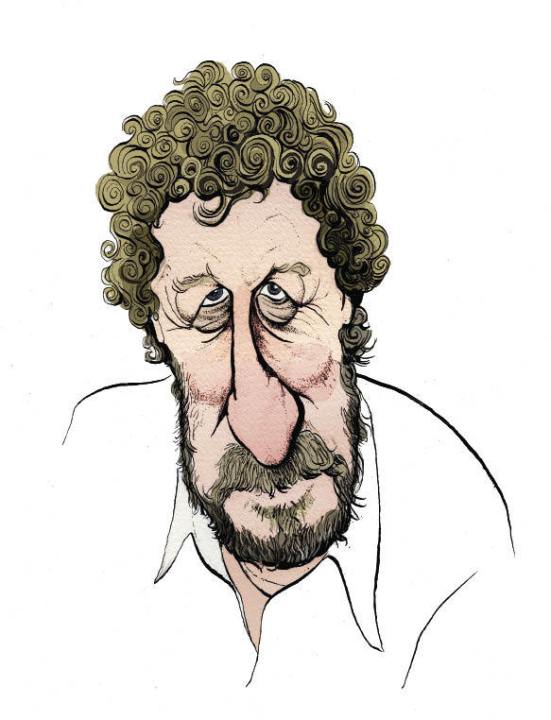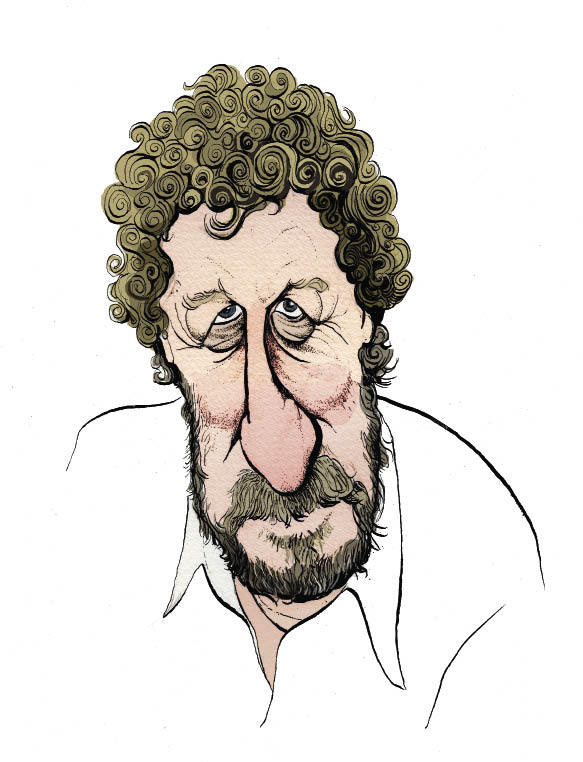The writer Sebastian Faulks exudes a sense of calm accomplishment. But even he seems tense about the stage adaptation of his bestselling novel Birdsong
‘I’m not excited. I don’t do excitement,’ says Sebastian Faulks. Which is probably just as well. Four years have elapsed since the project he’s currently involved with, a dramatisation of his bestselling novel Birdsong, was first suggested to him by the playwright Rachel Wagstaff. I meet them both in Faulks’s Holland Park flat, where he writes every day on a huge Apple Mac overlooked by miniature portraits of two deceased colleagues. A picture of Dickens, which belonged to his mother, hangs on the wall beside a relief of Tolstoy reproduced on what looks like the bottom of an ashtray. ‘From his house in Moscow,’ Faulks explains. ‘You nicked it?’ ‘No,’ he mutters, ‘it’s from the gift shop, I’m afraid. The gift shop, yes, along with the Anna Karenina tea cosy.’
He admits he was ‘pretty discouraging’ when Wagstaff first offered to write a stage version of his Great War bestseller. ‘Adaptations of long novels seldom work. And you put something into one form because that’s the right form for it. Birdsong is a novel and it uses a lot of novelistic resources, changes of time, variations of scale. It can go very big and very wide. It can go very narrow and very intimate. That’s hard to do on stage. But then it’s not really my work. It’s what Rachel and the cast and Trevor Nunn [the director] have created.’
Faulks is at pains to stress the boundaries of artistic ownership – it’s his novel but their play – and as if to underline this he leaves me chatting with Wagstaff for a few moments while he makes coffee next door. She tactfully reinterprets his avowed lack of enthusiasm as self-deprecation. From the start, she says, he was full of praise for her scripts. ‘No, it was her. She wore me down!’ he says, as he comes back in with the drinks.
Even at the age of 57, Faulks has an air of physical exceptionality. He’s as tall as the frame of his doors and unusually lean, but it’s more than that. Extra sources of health and vibrancy force themselves to the surface in small details – the loose yellow curls, the yacht-bronzed skin, the dark beard that manages to look both trim and slightly grizzled. He exudes a sense of calm and unswaggering accomplishment. Good things happen to him. Things such as Trevor Nunn, who became involved in the project almost by accident.
‘I was at a lunch given by the Sunday Telegraph arts page,’ he says. ‘I don’t know what function these lunches have but I found myself opposite Trevor’s wife, Imogen, and she told me he’d read Human Traces [published in 2005] and thought it was the most wonderful novel of the last 100 years. “He wrote you a letter about it. Did you get it?” I hadn’t, so I said, “No. Oh well. Lost in the post. But while you’re here would he like to direct the stage version of Birdsong?” And she said, why not?’
We discuss the challenges presented by adapting a novel with dozens of locations, three separate timelines and at least 40 characters. Wagstaff simplified things by dropping one timeline, using two locations and shrinking the cast to 15. The hardest technical problem is the climax, which takes place underground where two characters, buried alive after an explosion, comfort each other as they await their doom. Faulks chose this forgotten aspect of the war – the vast networks of tunnels beneath the trenches and the battles fought hundreds of feet below ground – as a way of drawing readers in. ‘A lot of people of my generation hadn’t really grasped what happened in the first war. But there were plenty who knew a lot about it and to get both sets of readers, I decided I’d have to tell people who were well read and historically literate something they didn’t know. The tunnels served that purpose. And there’s the symbolic thing, too – a hell within a hell.’
Wagstaff prefers to keep me in suspense about the physical solutions that she and her designer, John Napier, have come up with. But she assures me Napier is a genius. ‘He showed the cast the model box [a small replica of the stage fittings], explaining exactly what was going to happen. And at the end of the second act they all wooed and clapped. And by the end of the third act some of them were crying.’
‘At the model box?’ says Faulks. ‘It got a standing ovation,’ she says. ‘And I thought, gosh, this could be quite powerful.’ ‘Oh,’ huffs Faulks. ‘I thought you were going to say my wonderful book got an ovation. Or your beautiful script. Not the fucking model box!’
Beneath the polite, diplomatic surface of their talk I can detect certain pre-match anxieties. The play opens to the critics on Monday and neither has the faintest idea what public fate awaits them: triumph and adulation, disaster and ridicule, or something in between. It’s a relief when we move away from the production itself and turn to the wider topic of the Great War and its historical position in the 20th century. Faulks has evidently pondered this long and hard. ‘The events of the first war were deliberately forgotten very quickly because the people who survived it couldn’t find ways of expressing what they’d been through. Twenty years later, at the time when it might reasonably have been resurfacing, another world war came along. And that was remembered very differently, not just remembered but memorialised, particularly the Holocaust aspect of it. So the first war was blotted from view by a deliberate forgetting, followed by a deliberate memorialising.’
He agrees when I suggest to him that the resurgence of interest in the Great War owes itself to the end of the cold war. In the last two decades a succession of hugely successful novels have explored the experience of soldiers in the trenches. Birdsong led the way. Our appetite for tales of armed conflict is nurtured by the tragic fact that the fall of the Berlin Wall finally made the world safe for war. Until 1989 the superpowers were restrained from aggression by the ‘flashpoint’ theory, itself a relic of Sarajevo 1914, which made them anxious that a military exchange anywhere on the globe might trigger a vast terminal shootout. So in the decades following 1945 wars were fought sparingly and trepidatiously (with a few obvious exceptions), until the collapse of Soviet Russia put the small-war option back on the table.
Since then, America and its allies have blundered around the world fighting any conflict that takes their fancy, in Somalia, in the Gulf (twice), in the Balkans, in Sierra Leone, in Afghanistan and elsewhere. We fight without fear of nuclear reprisal and we send our troops into sovereign territory without even declaring war. Platitudes about ‘spreading freedom and western values’ are fed to the citizenry at home, who mistrust the notion that liberty can be enforced at gunpoint and who watch with rising disquiet as the slain return in coffins from these ill-lit, semi-secret, underexplained conflicts. Instead of the cold war we have a hot peace, and it shows no sign of cooling down.
In this context the Great War appeals to us because of its gruesome purity. Its origins and causes are rarely mentioned, let alone analysed, in Great War fiction because they expired with the armistice. All that’s left is the brutality of the front – the ‘mechanised abattoir’, as Faulks terms it – which looms before us in all its blood-soaked futility, and which we’re moved to contemplate now precisely because it’s not over. It’s still happening.
When he wrote the book in 1993, Faulks hadn’t foreseen that his revival of the ‘forgotten war’ would elicit such keen interest from the public. He entertained only a modest hope that the end of the century would bring renewed interest in its first dreadful conflict. His wager paid off. The novel sold three million copies.
As I’m leaving, I throw him a question about the coalition and he becomes uncharacteristically animated. He admits to a crush on Dave. ‘He’s clever. He’s got a sense of humour. He talks about America in a grown-up way.’ Did you vote for him? ‘As a novelist you should never disclose your political affiliations. It alienates too many readers.’ He admits to voting Lib Dem in 2005.
‘So you supported Nick Clegg?’ The very mention of the name draws a shadow across Faulks’s golden brow. An ominous note enters his voice. ‘I don’t like Clegg,’ he says slowly and with real venom. ‘Those TV debates. The new politics? Pretending the Liberals have just been invented when they’re older than the other parties put together. Now he’s going round announcing that he’s introducing the biggest constitutional reforms since 17-something or other. You want to tell him, “Calm down. Get back in your box.”‘ He finishes with something that I feel sure I must have misheard. ‘Sorry,’ I say with cupped ear, ‘Did you describe Nick Clegg as a self-important little tit?’ ‘Yes, I did,’ says the author of Birdsong. ‘That’s what he is.’ A little tit. Perhaps he meant the bird.
Birdsong is previewing at the Comedy Theatre in London.








Comments